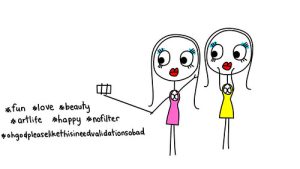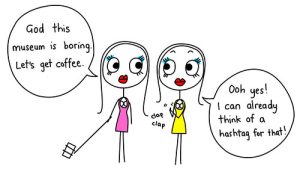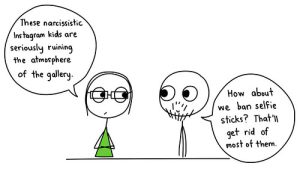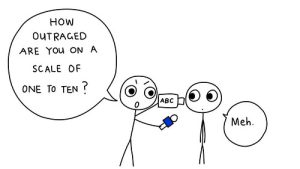Watch on: YouTube Dailymotion 优酷
#1402 How To Reply To
Thank You, Selfie Stick Ban, Gumboot, Sweet As
Thank You, Selfie Stick Ban, Gumboot, Sweet As
Hi, I’m Sarah, welcome to The Daily English Show.
This is a picture of some lettuce.
Do you know how to spell lettuce?
Today’s mistake comes from a sign I saw in front of the vegetable store near the place
I used to live.
I used to live.

Can you spot the mistake? That’s right. There’s no a in lettuce.
Last week I was browsing Pinterest and I came across some really nice images for
learning English. They were from a site called The English Student. And that’s the site
that I recommend you check out today – theenglishstudent.com
learning English. They were from a site called The English Student. And that’s the site
that I recommend you check out today – theenglishstudent.com
I think it’s really well organized into different sections like slang, idioms, grammar
and I really like the illustrations and the clear explanations that go along with them.
and I really like the illustrations and the clear explanations that go along with them.
This is an illustration from the site. It’s a list of examples of how you can respond
when someone says: Thank you.
when someone says: Thank you.
You’re welcome. My pleasure. Happy to help. Don’t mention it. Not at all. Of
course. Anytime. No problem. You bet. Sure thing.
course. Anytime. No problem. You bet. Sure thing.
I usually say: You’re welcome. Or one that’s not on this list: No
worries.
worries.
How about you – what’s your favourite way to respond to: Thank you?
Kia ora in Stick News today the Gallery of Modern Art in Brisbane, Australia has banned
selfie sticks.
selfie sticks.
These days, there’s no value in doing anything unless you post a photo of yourself
doing it
doing it
– or appearing to be doing it – on social media.
Many aspiring famous people carry a smartphone monopod – or selfie stick –
everywhere they go.
everywhere they go.
Several museums have now banned selfie sticks including the Gallery of Modern Art
in Brisbane.
in Brisbane.
The abc quoted a local as saying: “It could be a problem for some people but for
the majority, yeah, I think it’s not a big problem.”
the majority, yeah, I think it’s not a big problem.”
And that was Stick News for Wednesday the 11th of March.
Kia ora.

#fun #love #beauty #artlife #happy #nofilter
#ohgodpleaselikethisineedvalidationsobad
(Oh god please like this i need validation so bad)

God this museum is boring. Let’s get coffee.
Ooh yes! I can already think of a hashtag for that!

See if you position the phone like this, tilt your chin, make duckface …
#genius! #sexy! #hot!

These narcissistic instagram kids are seriously ruining the atmosphere of the museum.
How about we ban selfie sticks – that’ll get rid of most of them.

HOW OUTRAGED ARE YOU ON A SCALE OF 1 TO 10?
Meh.
Drawings on Flickr
Today’s word is gumboot.
I’m not a huge fan of gambling, but every couple of years or so I buy one of these.
This is what
’s known as an Instant Kiwi here in New Zealand. And Wikipedia says that in other places
they’re called: scratchcard, scratch off, scratch ticket, scratcher, scratchie,
scratch-it, scratch game,scratch-and-win, instant game or instant lottery.
And they usually have some kind of theme to entice you to throw your money away on this
– what is now a – useless piece of paper.
– what is now a – useless piece of paper.
The theme of this one is gumboot challenge. And you can’t see it very well, because
most of it’s scratched off, but there were some pictures of people throwing gumboots …
which is something that people do here in New Zealand. Not just randomly throw gumbooots
– it’s usually a game at some kind of festival.
most of it’s scratched off, but there were some pictures of people throwing gumboots …
which is something that people do here in New Zealand. Not just randomly throw gumbooots
– it’s usually a game at some kind of festival.
Gumboots also have many other names depending on which part of the world you’re in.
Let’s take a look at Wikipedia’s list.
Let’s take a look at Wikipedia’s list.
The Wikipedia article calls them wellington boots and says: Wellington boots are also
known as rubber boots, wellies, wellingtons, topboots, billy-boots, gumboots, gumbies,
gummies, rainboots, gavin’s, Alaskan Sneakers, kboots …. kboots? Not too sure about
that last one.
known as rubber boots, wellies, wellingtons, topboots, billy-boots, gumboots, gumbies,
gummies, rainboots, gavin’s, Alaskan Sneakers, kboots …. kboots? Not too sure about
that last one.
How about you? Do you call these things gumboots, like me, or something else?
Jason: How do people respond to “thank you” in New Zealand?
Sarah: It depends on the person. “It’s OK” is common.
Jason: It’s OK?
Sarah: Yeah. “It’s OK” or “that’s OK” or “it’s all right” or “that’s all right”.
Jason: How about “you’re welcome”?
Sarah: I use it a lot. I like it because I feel like you’re kind of acknowledging that
you appreciate that they said thank you. Especially if you have gone to some kind of
effort, like preparing them a meal or something. But if it was for something small like
lending them a pen then I’m probably more likely to say something like no worries.
Because I don’t want it to seem like I think I’m doing them a huge favour by lending
them a pen.
you appreciate that they said thank you. Especially if you have gone to some kind of
effort, like preparing them a meal or something. But if it was for something small like
lending them a pen then I’m probably more likely to say something like no worries.
Because I don’t want it to seem like I think I’m doing them a huge favour by lending
them a pen.
Jason: So it depends on the situation?
Sarah: Yeah, exactly.
Jason: Do people use “you bet” in New Zealand?
Sarah: I think that’s more of an American thing. Yeah, no, I don’t think I’ve ever
heard anyone say in New Zealand say “you bet”. Oh, “sweet as” is another one that’s
common. Or “sweet”.
heard anyone say in New Zealand say “you bet”. Oh, “sweet as” is another one that’s
common. Or “sweet”.
ESL Video Quiz: #1402 Thank you
ENDING
And that was The Daily English Show.
Thank you for watching. If you’re not there already, please go and check out today’s
script: thedailyenglishshow.com/1402.
script: thedailyenglishshow.com/1402.
We post quizes every weekday on ESLvideo.com so if you go to the script and follow the
link to the quiz then you can test yourself on Question Answer again.
link to the quiz then you can test yourself on Question Answer again.
See you tomorrow. Bye!
LINKS
today’s news
Monopod – Wikipedia
CREDITS
Question Answer + Ending
track: If The Blues Were Some Other Color by: The James Quintet licence:
CC-SA BY 3.0
CC-SA BY 3.0
Photos
lettuce by Dwight Sipler licence: CC BY 2.0
lettuce sign by studio tdes licence: CC BY 2.0
gumboots by James
Lee licence: CC BY 2.0
Lee licence: CC BY 2.0
Show intro
track: Nothing In The Dark by: Josh Woodward licence: CC
BY 3.0
BY 3.0
Click Here intro
sound: mouse click by: CGEffex CC BY
3.0 thanks to freesound.org
3.0 thanks to freesound.org
sound: crickets by: Johnny Pixel
Productions licence: CC BY 3.0
Productions licence: CC BY 3.0
Stick News intro
track: Pyramid by: Capashen licence: CC BY-SA 3.0
sound: static by: Joel
Gerlach licence: CC0 1.0
Gerlach licence: CC0 1.0
video: static by: REC Room licence: CC BY 3.0
sound: bell by: kaonaya licence: CC0 1.0
Word Of The Day intro
sound: plane by: Ben Shewmaker licence: CC BY 3.0
track: Prá Hermeto by: Ruben Ferrero licence: CC BY-SA 3.0
Conversations With Sarah intro
sound: bubbles by: Razzvio licence: CC BY 3.0
Question Answer intro
sound: chalk by: thavis360
licence: CC0 1.0
sound: chalk by: thavis360
licence: CC0 1.0
Did you notice a mistake in this script? Please leave us a comment and tell us!
We really appreciate people pointing out our mistakes. Thank you.
Have you translated this script – or part of it – into your language for English
practice and published it on your blog? Please leave a comment and a link so
other people can read your translation. Thank you.
Published: Wednesday 11 March 2015
